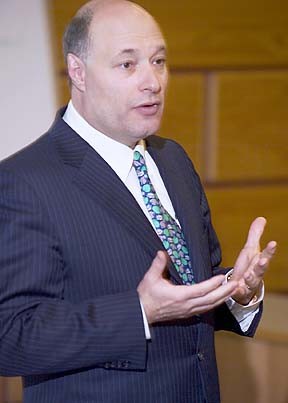Maker of anthrax vaccine discusses challenges of marketing overseas
By Courtney Potts '06
BioPort is the only FDA-licensed producer of the anthrax vaccine.
On March 9, MBA students taking International Political Risk Management, a course taught by Elena Iankova, a lecturer at the S.C. Johnson Graduate School of Management, heard Fuad El-Hibri, chairman and CEO of Bioport's parent company, Emergent BioSolutions Inc., discuss the hurdles his firm faces in making and marketing its products abroad.
His guest lecture was titled "Managing International Risk in the Bio-Defense and Telecommunications Industries."
Using his own company as an example, El-Hibri outlined six areas of risk in international business, among them export/import regulations, politics at home and abroad and financial issues. Much of his talk focused on political issues ranging from export regulations to how to deal with foreign governments.
One hurdle: when BioPort sought to export its anthrax vaccine, BioThrax, the U.S. Department of Defense claimed the vaccine was primarily of military importance and should therefore fall under International Traffic in Arms Regulations (ITAR). Under ITAR, export of the vaccine is controlled by the Department of State and a license is required for each sale. BioPort succeeded in arguing that its product was non-military in nature and therefore belonged under Export Administration Regulations (EAR). Exportation under EAR is controlled by the Department of Commerce and has far fewer restrictions.
El-Hibri seemed to take such challenges in stride. "Obviously," he said, "the U.S. government is interested in vaccines, especially bio-defense vaccines." It controls which countries vaccines can be exported to and may use them as a bargaining chip in its own deals with foreign ministries of defense, he commented. "They like to throw our vaccine into the mix and say, 'Listen, if you buy one more tank or one more fighter jet ... we'll throw in 10,000 doses of anthrax vaccine,'" he said. But such giveaways create problems for companies like BioPort by reducing demand for its products in foreign countries.
Some uncontrollable variables that affect the demand for vaccines are: Politics within the foreign country, the country's relationship with the United States, its finances, its fears about external threats and regional geopolitics, noted El-Hibri.
He also repeatedly mentioned the importance of having local connections. "It is critical that you appoint or partner up with a local distributor," he stressed. A local partner can help businesses stay abreast of the political situation and provide valuable insight into local culture and customs, he said, noting that acceptable business practices often vary widely between countries.
For example, in many countries it is common practice for businesses to offer bribes or gifts to government officials in return for their assistance, he commented. But under U.S. law, it is illegal for American companies to do so, with stiff penalties for violations. While the restriction can be circumvented by giving small gifts, under $25 in value, a better policy is to avoid gifts altogether, said El-Hibri, and instead get close to decision makers by developing relationships with them, helping them solve some of their problems.
He also stressed that the media can be either an important ally or a formidable enemy. "Many of our competitors aren't as media savvy as we are and that gives us an edge."
Iankova later said of El-Hibri's talk: "I was impressed because he's put a lot of effort into addressing exactly the issues we addressed in class. [It was] very helpful for my students."
Gligor Tashkovich '87, MBA '91, who worked with El-Hibri in the telecommunications industry and helped to organize his visit to campus, called him "a brilliant businessman and entrepreneur."
And Herb Lara, MBA '06, president of the Health Care and Biotechnology Club, a student group at the Johnson School, enjoyed having the opportunity to hear El-Hibri speak. "Bio-defense is something that's not a widely available topic for discussion, so it was definitely a big deal to have someone of his stature come here to talk to us," he said.
Before entering the biopharmaceutical industry 15 years ago, El-Hibri worked at Citicorp and Booz Allen & Hamilton.
Courtney Potts is an intern with the Cornell News Office.
Get Cornell news delivered right to your inbox.
Subscribe